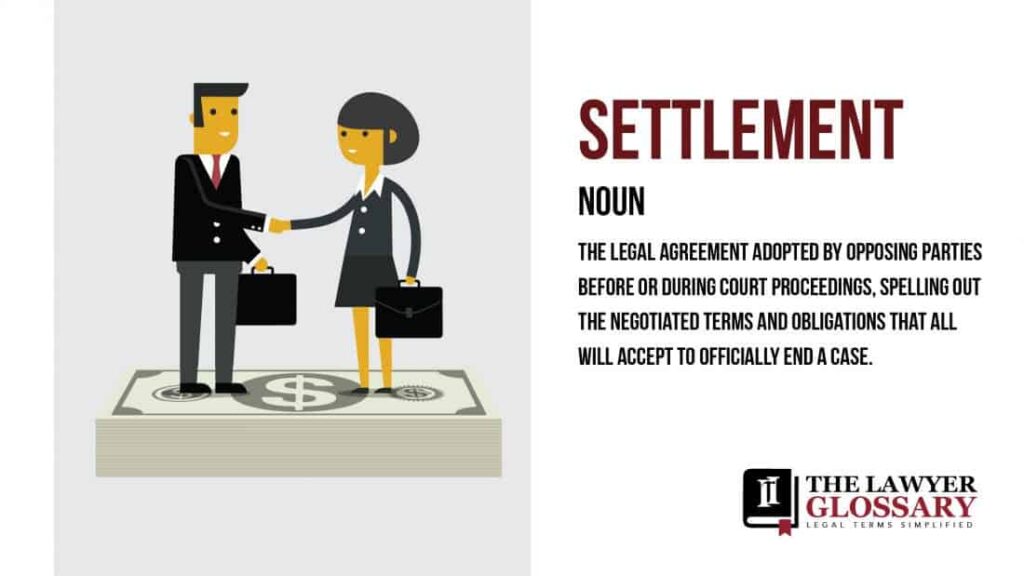What Is Settlement?
In Civil Law, Settlement refers to the legal agreement adopted by opposing parties before or during court proceedings, spelling out the negotiated terms and obligations that all will accept to officially end a dispute.
Most civil cases are decided not by trial, but by settlement. Even cases entering mediation or arbitration, instead of a traditional trial, will often choose a settlement deal.
Watch this 1-minute video defining Settlement:
Why Choose a Settlement Agreement?
Settlement means an end to further court proceedings. That directly translates into significant savings of time, money and even damage to reputation. Trials often expose the financial and personal vulnerabilities of those involved. Settlement provides a quicker solution and alternative to an ongoing court battle.
The decision to offer and accept — or refuse — a settlement falls to the parties in the case, calling upon the attorneys involved to negotiate the exact terms of the agreement.
Other common forms used:
- Settling out of court
- Settle the case
- Settlement offer
What Is a Structured Settlement?
This type of settlement deal establishes scheduled periodic payments to meet the terms of the agreement instead of one lump sum payment.
What is a Class Action Settlement?
When a group of people who have been wronged sue another person or entity, this is the agreement that covers the specific terms for the entire group, or “class.”
What is a Mandatory Settlement Conference?
Many civil cases require a settlement conference as a first attempt to solve the dispute between opposing parties. Parties and their lawyers will present an outlined version of their side of the case and they will determine if an immediate agreement can be reached to settle the case.
1-min Audio Clip With Attorney Darryl Isaacs Discussing Settlement Meaning
Defining Settlement – Let’s Break It Down In Layman’s Terms:
Someone has done you or your property harm and you believe you are owed repayment of the damages they have caused. You have strong evidence on your side and believe you can prove it. You, as the plaintiff, decide to sue the one who did you harm, the defendant, and hire a lawyer to set the legal wheels in motion.
In order to get the justice and repayment you deserve, it will not always be necessary or even recommended to go into a traditional courtroom for a trial. If you have a strong case, and all parties realize it, there may not be a reason for a fight – the other side may immediately be willing to meet your terms, and the case will be settled then and there by drafting a binding agreement of how you will be repaid and what other actions, if any, will be necessary.
Think of settlement, or settling out of court, as skipping right to the conclusion, getting what all parties can agree on, and closing the case. Of course, when negotiations break down and an agreement cannot be met, that’s when the parties in the case get a judge and jury involved in a trial to make a decision as to what the consequences and repayments will look like.
Settlement nearly always falls under the category of Civil Law. If criminal matters are involved, those would be handled in a separate Criminal Law case.
You might hear “settlement” used like this, here’s what it means:
“That’s something we can add to the settlement agreement.”
Translation:
The defendants who wronged you not only should be paying you money, but there may be some property or similar items of value that we will include in our settlement offer.
“They declined to accept our offer of settlement, so we’re going to trial.”
Translation:
On this particular issue, like demanding payment of $350,000, you’ve indicated that you are not willing to budge. If they don’t agree to these settlement terms and refuse to pay, we’ll go all the way to trial until a judge and/or jury decides in your favor based on the evidence of our case.













